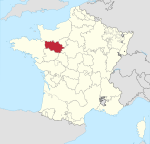The 1955 Le Mans disaster was a major crash that occurred on 11 June 1955 during the 24 Hours of Le Mans motor race at Circuit de la Sarthe in Le Mans, Sarthe, France. Large pieces of debris flew into the crowd, killing 83 spectators and French driver Pierre Levegh, and injuring around 120 more. It was the most catastrophic crash in motorsport history, prompting Switzerland to institute a nation-wide ban on motorsports altogether that lasted until 2022.
The crash started when Jaguar driver Mike Hawthorn pulled to the right side of the track in front of Austin-Healey driver Lance Macklin and started braking for his pit stop. Macklin swerved out from behind the slowing Jaguar into the path of Levegh, who was passing on the left in his much faster Mercedes-Benz 300 SLR. Levegh rear-ended Macklin at high speed, overriding Macklin's car and launching his own car through the air. Levegh's car skipped over a protective earthen berm at 200 km/h (125 mph) and made at least two impacts within the spectator area, the last of which caused the car to disintegrate, throwing him onto the track where he was instantly killed. Large pieces of debris, including the Mercedes' engine block, radiator, front suspension, and bonnet (hood), were sent flying into the packed spectator area in front of the grandstand. The rear of Levegh's car landed on the berm and exploded into flames.
There was much debate over blame for the disaster. The official inquiry held none of the drivers specifically responsible and criticised the layout of the 30-year-old track, which had not been designed for cars as fast as those involved in the crash.








